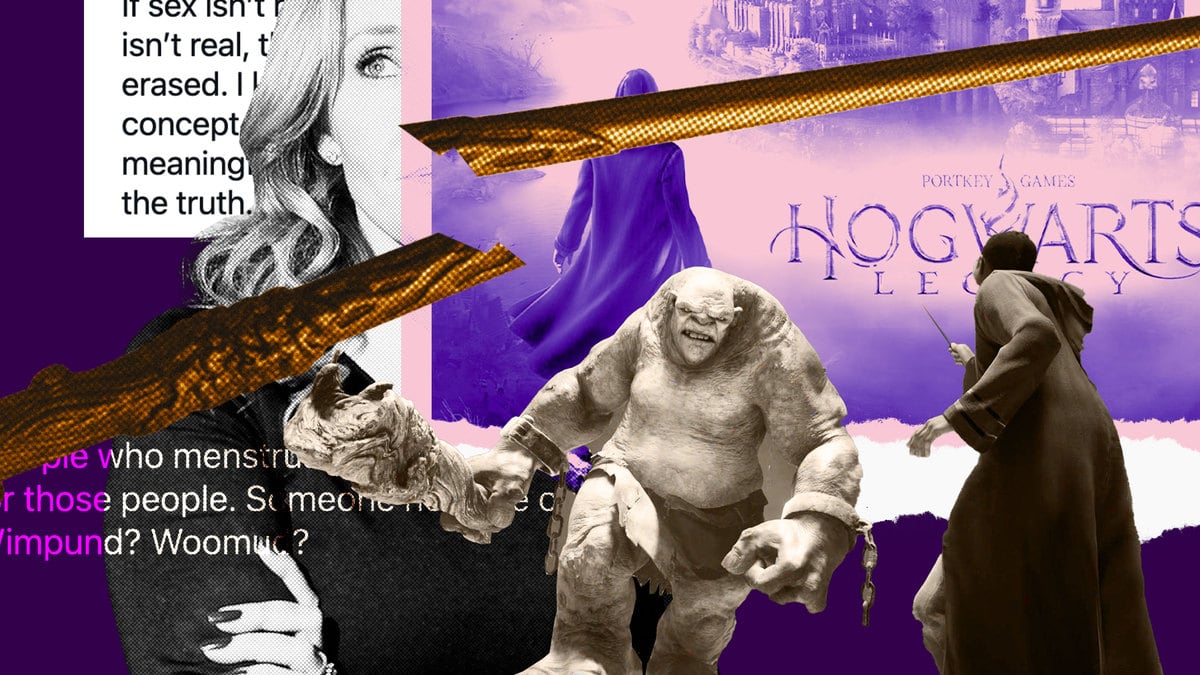In August 2022, at the German video game industry conference Gamescom, the yet-to-be-released action role-playing game Hogwarts Legacy won its first accolade: “Best Trailer,” on the strength of a freshly premiered, two-minute first look. The trailer was broadcast to thunderous applause among those in the live Gamescom audience. But rather than a shadowy panel of judges, anonymous users voted to give the game its big win.
The audience-driven achievement—small as it might be, in the grand scheme—demonstrated an uncomfortable reality: The Harry Potter franchise, including the expanded wizarding world and the then-unreleased Hogwarts Legacy, remains immensely, unstoppably popular.
In light of its controversial creator’s personal values—namely, J.K. Rowling’s transphobic outbursts in the years since she finished the novels—this overwhelming show of support for the franchise’s latest big product feels troubling. And now that both the overwhelmingly positive reviews and the game itself are here, fans past and present are forced to make a choice: Will they buy Hogwarts Legacy?
This question is why, for all the enthusiasm displayed by some parts of the Harry Potter community, Hogwarts Legacy developer Avalanche Software and its label, Portkey Games, appears to be in a bit of a pickle. Rowling’s stance on transgender issues has been increasingly polarizing since the PlayStation 4/5, Xbox Series S/X, and Nintendo Switch game’s development was first leaked back in 2018. (It was officially revealed in 2020.) Between her public support for researcher Maya Forstater who has repeatedly sprouted transphobic claims, and Rowling’s own transphobic rants on Twitter, Rowling has garnered support from trans- and queerphobic feminists as well as waves of backlash, most particularly from LGBTQ+ communities and the cast of the Harry Potter and Fantastic Beasts movies.
To that end, the development team has opted to downplay Rowling’s direct involvement on Hogwarts Legacy, while artfully steering clear of mentioning the creator in interviews and promotional activities. It’s also telling that Hogwarts Legacy’s lore is set before the novel series’ main timeline and and without the iconic trio of Harry Potter, Hermione Granger, and Ron Weasley—a point that culture critic Gita Jackson has eloquently written about in their Vice article on the game. While the game is clearly spun off from her property, Rowling’s actual characters and words are notably absent from the marketing.
The developers have teetered on the degree of Rowling’s involvement with the game. For one thing, the team needed Hogwarts Legacy to stay true to Rowling’s vision of the Harry Potter universe, if only to inject a note of authenticity for fans of the series. In the FAQ page on the game’s website, the developer has stated that Hogwarts Legacy is “firmly rooted in the magical universe of the Wizarding World”, and that Rowling’s team will collaborate “with [publisher] Warner Bros. Games on all aspects of Hogwarts Legacy to ensure it remains a true part of the Wizarding World experience.”
Despite the developers’ best efforts to minimize Rowling’s involvement, online movements to boycott the game are already underway. Those who are opposed to Rowling’s transphobic Twitter rants have sworn not to play Hogwarts Legacy, and this is despite the nostalgia many still hold for the Potter books. That’s because it’s hard to shake the knowledge that supporting the series stands to financially benefit Rowling—further empowering her to spout gender-essentialist ideas online.

But the most deeply devoted members of the Harry Potter community continue to hype up the game, even if they disagree with Rowling’s politics. On the official Hogwarts Legacy Reddit channel, any discussions on Rowling are explicitly banned, with its mods keen to limit threads to discussions of the game only. (There is an open thread for fans who are “conflicted about buying the game,” however.) To avoid invoking Rowling, some Potter fans are even crediting the series to other people entirely. In one extreme example, a growing chorus of fans have started suggesting that the Harry Potter series is the sole creation of the ridiculously talented vocaloid popstar, Hatsune Miku. (In one instance, Britney Spears has also been credited as the real author of Harry Potter.)
Others have chosen to apply the literary theory of “Death of the Author” to justify their interest in Harry Potter and Hogwarts Legacy—to separate the art from the artist, so to speak—by suggesting that Rowling’s personal beliefs as a writer can be regarded as removed and distinct from her works.
Props to Miku, obviously, but there’s a problem with this approach of justifying one’s interest in a product without supporting its maker. One of the biggest issues is that “Death of the Author” applies a form of literary criticism on a series that has gone far beyond its literary roots: Harry Potter is now a sprawling multimedia franchise, spanning across nearly a dozen films, a Broadway play, myriad video games, and more. The theory of analyzing written works on their own merits originates from a 1967 essay written by critic Roland Barthes—way, way before the era of Twitter outbursts and online transphobic meltdowns.
Barthes, quoting a line from French novelist Honoré de Balzac on femininity, insisted that there’s no way to tell if an author (in this case, Balzac) was professing his own opinion through the protagonist he had written—and it is wrong to assume he was. “Writing is the neutral, composite, oblique space where our subject slips away, the negative where all identity is lost, starting with the very identity of the body writing,” Barthes explained. In short, language is the void where authorial intent and identity cease to exist, with meaning created only by the reader when these words are seen, rather than the author.
To use this theoretical principle as rationale for still engaging with the Harry Potter series, fans need to shut out not just Rowling’s political leanings and any Rowling-related ramblings—admittedly difficult when she has a massive following of 14 million on Twitter alone, and can easily inspire headlines with an errant tweet.
They also need to overlook her infamous Potter retcons. Remember when she retroactively pointed out that beloved schoolmaster Dumbledore was actually in love with a man, despite no such evidence existing in the novels? Or how she explained the way wizards would relieve themselves in the olden days, simply by taking a giant dump right on their robes—and magick-ing the stains away after? What about when she responded to an inquiring reader that the minor character Anthony Goldstein was Jewish, despite never identifying him as such in the books?

But Rowling makes this harder to do because of her continued public attachment to her creation. She still engages with the Harry Potter franchise, by publishing occasional articles via Wizarding World Digital and writing the screenplays for the ongoing Fantastic Beasts and Where to Find Them films. Beyond her writing, her influence is imprinted upon every aspect of Harry Potter media, which remain so successful. It’s why Portkey Games, for instance, is a video games label dedicated to the creation of more games set in the wizarding world—even 25-plus years later, there are seemingly more stories to tell in Rowling’s universe. The author’s influence is inescapable, and this is only fuelled by the sheer prevalence of the Harry Potter series in pop culture.
In the end, whether or not Rowling can be extricated from Harry Potter can feel like a largely academic argument, which is perhaps ill-suited for such a topic. After all, “Death of the Author” was ultimately written by a white, French critic far too immersed in abstract literary theories and Western popular culture. And divorcing Rowling’s bigotry from the wizarding world is hugely tempting, especially since it can be extremely painful to reject something this foundational to our own memories as a fan. Like its boy hero, Harry Potter has helped many people live through their own tumultuous childhoods.
But it still can’t be overstated how the Potter universe is fundamentally a reflection of Rowling’s values, even if Hogwarts Legacy is taking place in a pre-Harry Potter era. Take the series’ unsavory depiction of goblins, which is remarkably similar to antisemitic caricatures, for example; the goblins also play a large, complicated role in Legacy. There’s also her oddly implicit endorsement of elf slavery (the movies have, deliberately or not, eliminated any mention of their eternal servitude and Rowling’s mockery of Hermione’s anti-slavery activism). And there’s Nymphadora Tonks, an androgynous, short-haired witch, who rejected her given name as “Dora” and was disappointingly revealed to be canonically straight at the end of the final novel—a character many non-binary and transgender fans look up to as Rowling’s only seemingly queer heroine.
Most of all, there’s the main series’ neoliberal slant, in which the greatest evils known to wizards are vanquished without the need to enact any sort of lasting, systemic change within its universe, as encapsulated in this popular meme. While these specifics are probably not going to be explicitly addressed in the game, it’s testament to how the wizarding world—and Hogwarts Legacy—is rooted in Rowling’s beliefs and ideas. It’s, after all, something that even the developers of Hogwarts Legacy have freely admitted themselves when they called Rowling a crucial part of the franchise’s “foundation.”
Perhaps this can be encapsulated by my own disbelief on Hogwarts Legacy’s inclusion of transgender characters. Hogwarts Legacy offers players the option to create their own transgender avatars, according to reports and players with early copies. At the same time, players will also get to meet a transgender character, Sirona Ryan, when they enter Hogsmeade Village; she’ll introduce herself as someone who wants to be seen as “a witch, not a wizard” by her own classmates. Yet it’s difficult to see her inclusion as anything else other than a salve against Rowling’s venomous transphobia, or to placate LGBTQ+ fans of Harry Potter still on the fence about consuming more Potter media.

What’s more, neither Avalanche Software nor its publisher, Warner Bros. Games, has a history of championing diversity or marginalized voices; in fact, a member of the Avalanche team ended up resigning before the game’s release, after a journalist dug up his inflammatory views and support of minority-targeting harassment campaigns. And there’s much more financial incentive for Warner Bros Games’ Portkey Games to keep publishing new Potter games, as long as there’s enough demand for them.
For this Harry Potter fan, at least, the choice is easy. There can be no “Death of the Author” applied here—as Rowling embarks on yet another transphobic tirade online, I can’t, in good faith, consider the joys of zipping around on a magical broomstick in Hogwarts Legacy.








